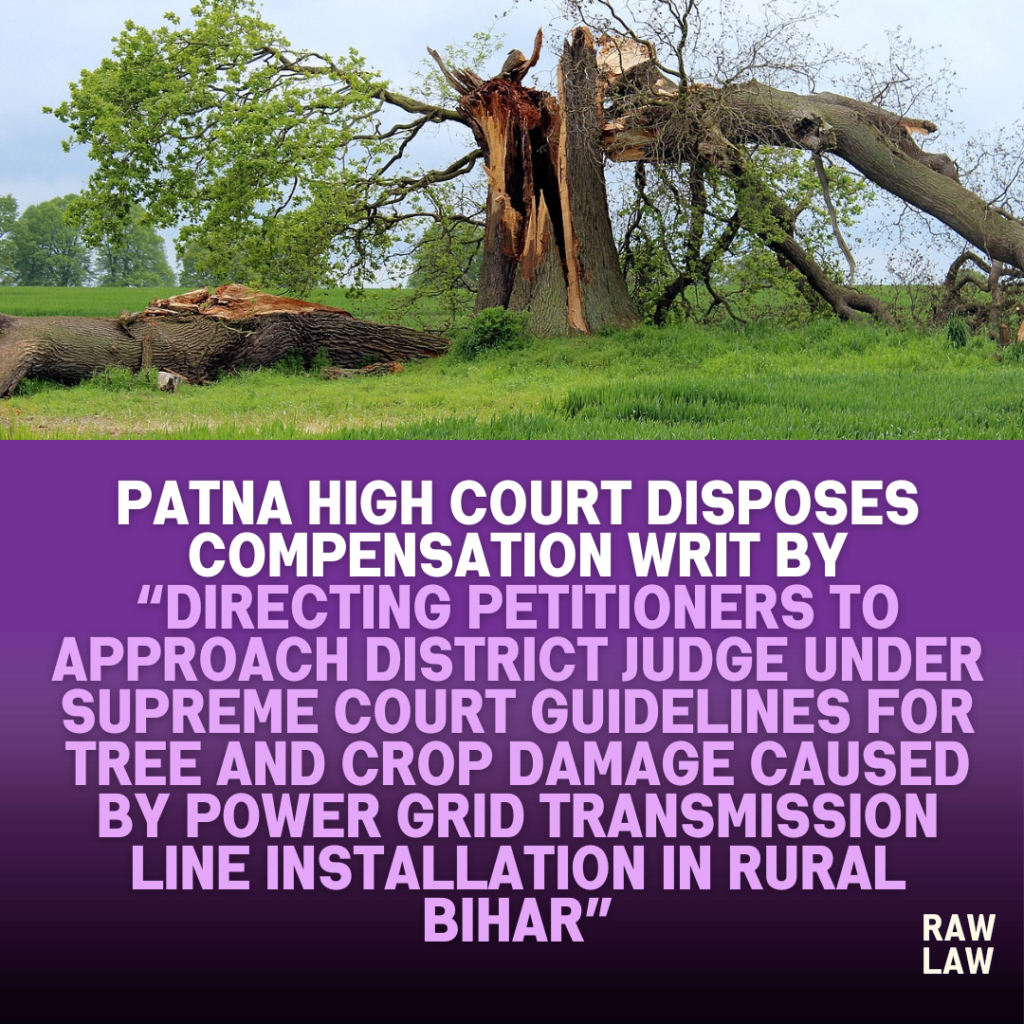Court’s Decision
The Patna High Court disposed of the writ petition seeking recalculation and payment of compensation with interest for the cutting of trees and crop damages caused by Power Grid transmission lines. It granted liberty to the petitioners to file an appropriate application before the concerned District Judge within four weeks for compensation, which shall be considered and disposed of on merits expeditiously.
Facts
The petitioners approached the High Court seeking:
- Recalculation and payment of compensation for trees cut and crop damages caused by Power Grid Corporation’s transmission line installation.
- Payment of interest on delayed compensation.
- Any other relief deemed fit in the facts of the case.
The respondents argued that the matter was covered by the Patna High Court’s prior judgment in Lalmuni Devi v. State of Bihar (CWJC No. 17625 of 2016), which was decided in light of the Supreme Court’s judgment in Power Grid Corporation of India Limited v. Century Textiles & Industries Ltd. (2017).
Issues
- Whether the High Court could grant recalculation and payment of compensation directly in the writ jurisdiction.
- Whether the petitioners were entitled to interest on compensation for trees cut and crop damages.
- Appropriate forum and procedure for seeking compensation under the applicable Supreme Court guidelines.
Petitioner’s Arguments
The petitioners argued that:
- They were poor villagers whose trees were cut and crops damaged due to Power Grid operations.
- They had not received fair compensation or interest despite repeated demands.
- Relief should be granted directly by the High Court to avoid further delay.
Respondent’s Arguments
The respondents submitted that:
- The issue was squarely covered by the Lalmuni Devi judgment of the Patna High Court.
- The Supreme Court in Power Grid Corporation of India Ltd. v. Century Textiles provided clear guidelines for seeking compensation.
- The appropriate remedy for the petitioners was to approach the District Judge for adjudication of compensation claims.
Analysis of the Law
The court considered:
- The Supreme Court’s ruling in Power Grid Corporation v. Century Textiles (2017), which held that disputes regarding compensation for damages caused by transmission lines should be adjudicated by the concerned District Judge.
- The Patna High Court’s prior judgment in Lalmuni Devi v. State of Bihar (CWJC No. 17625/2016), directing petitioners in similar matters to approach the District Judge.
These precedents clarified that writ jurisdiction was not the appropriate forum for calculating or granting compensation in such matters, and that petitioners should follow the prescribed mechanism under the Supreme Court guidelines.
Precedent Analysis
- Power Grid Corporation of India Ltd. v. Century Textiles & Industries Ltd. (2017 (2) PLJR (SC) 152):
- Held that compensation disputes arising from the installation of transmission lines should be decided by the concerned District Judge.
- Laid down guidelines for calculating compensation for damages and for the valuation of trees and crops.
- Lalmuni Devi v. State of Bihar (CWJC No. 17625/2016):
- The Patna High Court directed similarly situated petitioners to approach the District Judge for redressal of compensation claims under the Century Textiles judgment.
The Wakil Patel judgment applied these precedents to dispose of the matter in an efficient and procedurally correct manner.
Court’s Reasoning
The High Court noted that:
- The relief sought by the petitioners was fully covered by prior judgments.
- Direct interference in writ jurisdiction was unwarranted when a clear statutory and judicially approved forum was available.
- Petitioners should approach the District Judge, who would adjudicate the claims on merits and determine compensation.
The court provided a four-week window for filing the application before the District Judge and directed the matter to be disposed of expeditiously.
Conclusion
The writ petition was disposed of, granting liberty to the petitioners to file a compensation claim before the concerned District Judge within four weeks, with the assurance that the matter would be heard on merits and disposed of promptly.
Implications
- Reinforces that compensation disputes arising from transmission line installation should follow the Supreme Court’s Century Textiles guidelines.
- Clarifies the remedy for villagers seeking compensation for trees and crop damage lies with the District Judge, not in writ jurisdiction.
- Ensures a streamlined process for calculating fair compensation for poor farmers affected by infrastructure projects.
FAQs
1. What relief was granted by the High Court in this case?
The court allowed the petitioners to approach the District Judge within four weeks to seek compensation for tree and crop damages.
2. Why did the court deny direct relief under writ jurisdiction?
Because the Supreme Court mandated that such compensation disputes be decided by the District Judge under Power Grid v. Century Textiles guidelines.
3. What is the significance of this judgment for compensation claims against Power Grid?
It clarifies the proper procedure and forum, ensuring efficient adjudication while protecting the rights of affected villagers.
